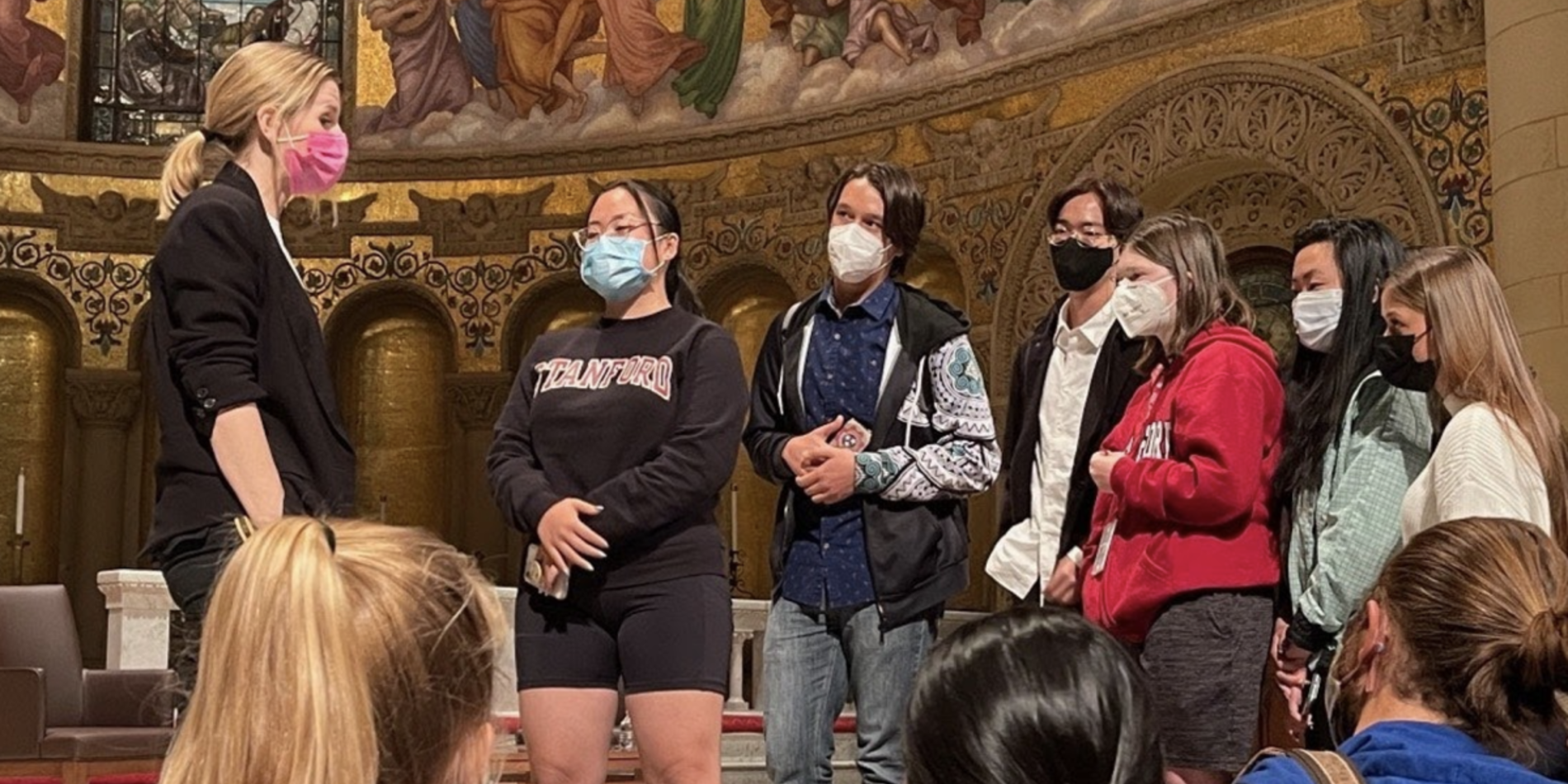[Above: ESF/PWR Students respond to Tara Westover’s talk on writing and her book, Educated]
On October 12, 2021, Tara Westover, author of Educated, addressed frosh in Education as Self-Fashioning (ESF) and COLLEGE programs in Stanford’s Memorial Church. The campus Spanish Revival church proved a fascinating setting for one of the few in-person ESF plenary lectures offered this fall. 600+ students and community members were in attendance to discuss education, life-purpose, and writing.
One of Stanford’s Three Books recommended reading for AY 2021-22, Westover’s Educated chronicles her journey from a reclusive Mormon survivalist family in rural Idaho, where her parents kept her out of school, away from doctors, and at work in the dangerous family junkyard. When she left for a university education, her life and worldview profoundly transformed.
A testimony to the life-changing power of liberal education, Westover’s book and Stanford talk offered more than a story of leaving behind family life. Speaking to students, she revisited the conditions necessary for her transformation: First, and mostly urgently, college success depends on existential safety and security. College offered Westover an unique opportunity for deep contemplation, but she only began to enjoy such experience when she received a scholarship that relieved her from working several jobs and constant preoccupation with college expenses. Once freed to think about her education, she became truly engaged.
That engagement, Westover asserted, includes diverse skills learning, some of which translate to vocations and others which serve personnel development and empowerment to communicate ideas. Westover encouraged students to make themselves “not simply useful to an employer,” but to “study something for yourself that speaks to you and the world.” Students related to her experience. ESF student Emma Barrosa reflected: “Dr. Westover reminded me to balance career considerations with my intellectual curiosities, allowing me to forge a meaningful education.” Sylvia Chin also commented that, “I was impressed with her combination of realism about work and optimism about learning for oneself and one’s purpose in the world.”
In that journey of skill-acquisition and self-development, one gains critical distance from family origins, but need not jettison home values in the process of interrogating them. Many students were impressed that although Westover left her faith in college and renounced everything she once believed, she now grasps some of the unique value her religious context imparted: “When I was 18 I was wrong about everything: I was homophobic, miysogynist, and completely ignorant of the suffering of marginalized groups.” However, the campus climate at BYU, she claimed, had one advantage secular institutions lack: “The ability to see the intrinsic worth in everyone as a ‘Child of God’ meant that I wasn’t just the sumtotal of my ideas about feminism that others rejected, but rather a person who deserved to be heard, even as they tried to dissuade me.” College education, for Westover, should reveal our own and others’ intrinsic worth, so that we are not merely defined by ideas we should be free to change again later.
In the Q&A afterward, Westover took students’ questions about how a person comes to know and value one’s and others’ “intrinsic worth” outside of religious concepts. Cydney Wright reflected on how her PWR “literacy” narrative articulated her own sense of self alongside that of her community. Diego Kagurabadza described writing his narrative about his complex Zimbabwean-Mexican-American belonging as a similarly affirming experience.
Listening to such student ideas clearly moved Dr. Westover, who encouraged students to pursue life-writing and contemplation. She advised them that daily writing practice is paramount. “Take your writing tools along everywhere to write and reflect on experiences with the world.” Students commented they felt strongly moved by such a practice. Edwin Mbewe, an international student from Zambia who plans to study bioengineering commented: “I liked how she saw writing as an important skill in work, life, everything: something we should practice daily.”



